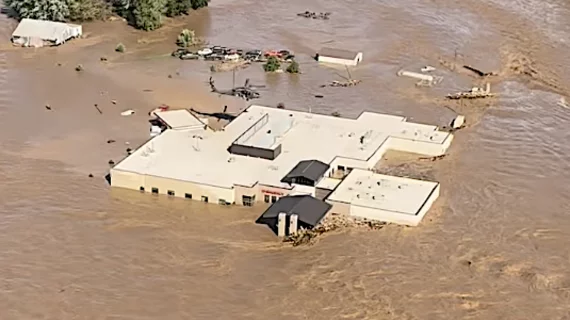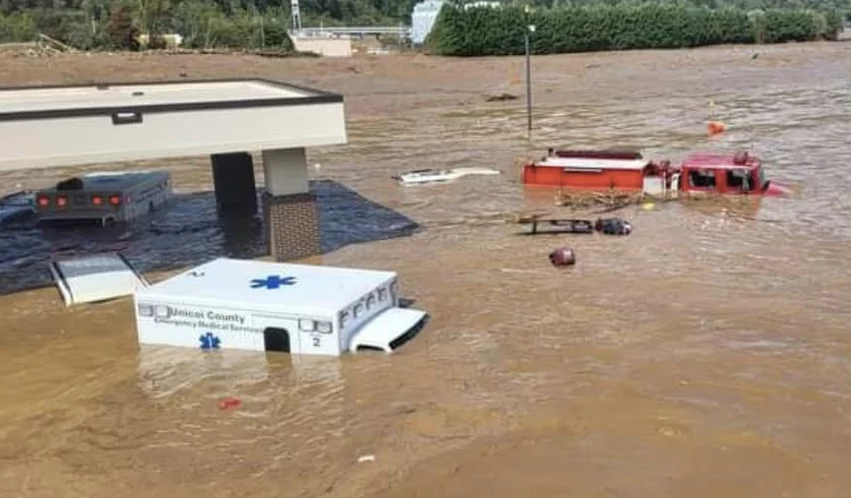Ballard Health hospital knocked out by flooding, patients evacuated via helicopter from Hurricane Helene
Ballad Health's Unicoi County Hospital in Erwin, Tennessee, was hit by massive flood waters Sept. 27 from Hurricane Helene. The one-story hospital was washed out by a 5-8 feet of rushing flood waters spilling over from the neighboring Nolichucky River. More than 60 patients and staff had to evacuate onto the roof of the hospital so helicopters could take them to higher ground.
CNN showed dramatic video footage of multiple helicopters pulling people off the roof as flood waters rushed by completely surrounding the hospital. Erwin Police Chief Regan Tilson said they were in the process of evacuating patients when the rising water overtook the road and the hospital began to flood. The water rose very fast and within 15 minutes everyone had to get onto the roof as the building became largely submerged. He said the water was moving too swiftly to use boats for the rescue.
The 10-bed hospital is located 50 miles due north of Asheville, North Carolina, which has been headlining a lot of the disaster news coverage. Patients were transferred to Johnson City Medical Center in Johnson City, Tennessee, about 22 miles north, Ballad Health said in a statement.
Floodwaters also devastated the rest of the town, which is located in a valley, nestled against the Unicoi Mountains in the southern Appalachian mountains.
"Unicoi County Hospital in Erwin has suspended operations and has evacuated patients. All patients and team members were successfully rescued from Unicoi County Hospital. The hospital remains closed until further notice," Ballad Health said.
The hospital is experiencing a propane leak, which poses a significant danger to anyone on the hospital’s property, it added. Staff will assess damage once flood water recedes. After that, it will provide updates to the community on the status of the facility. All patient care has been transferred to neighboring facilities in the region.
Ballad Health’s Corporate Emergency Operations Center (CEOC) was activated to direct disaster recover efforts for the health system throughout the 20 hospitals that serve primarily rural areas of the Appalachian Highlands in Northeast Tennessee, Southwest Virginia, Northwest North Carolina and Southeast Kentucky. Ballad said flooding, high winds and power outages continue to create problems throughout the Appalachian Highlands area.
Since the hospital in Erwin was knocked out by flooding, the health system opened a medical response tent in the auditorium parking lot of Unicoi County High School in Erwin to provide 24/7 first aid, triage for minor illnesses and injuries, and stabilization of emergency patients so they can be transferred to a neighboring hospital that is still operating trauma and emergency units.
The tent triage center is busy treating respiratory and skin infections. Wounds in contact with flood water are considered a high risk for infection, Ballard Health said in its announcements to the community. Both patients and staff are under boil orders for their water supply due to possible contamination from flooding in Johnson, Carter and Unicoi Counties.
Ballard Health, with several of its hospitals located in mountain valleys. It is among one of the hardest hit inland areas by the hurricane and its flash flooding caused by 17-30 inches of rain.
Other Ballard Health hospitals have limited operations
Neighboring 140-bed Greeneville Community Hospital has suspended all its services, except for its emergency room operations to due to water supply issues.
Ballard Health said in a statement all its inpatients were transferred to Holston Valley Medical Center, 40 miles north on the Virginia border.
Emergency obstetric (OB) services are still being provided for patients in active labor. OB patients with a scheduled induction at Greeneville Community Hospital are being asked to receive care at another hospital.
Greeneville is located 25 miles west of Erwin, but most direct roads between the towns are impassable due to storm damage, requiring a 43 mile detour through the mountains.
The hospital system lost access to phone systems and its network during the storm, but Ballard Health said this was restored as of Oct. 1—except for Johnson County Community Hospital in Mountain City, Tennessee. Electronic health record network connectivity had been restored and should be consistent throughout the Ballad Health system, except in Unicoi County, it said.
The Ballad Health CVA Heart Institute locations in Erwin and Mountain City also remained closed as of Oct. 1.
Sycamore Shoals Hospital resumes inpatient operations
Ballard's 121-bed Sycamore Shoals Hospital in Elizabethton, Tennessee suspended all operations except for its ER to absorb the expected inflow of disaster patients. The health system said rising flood waters forced the hospital to take proactive measures to evacuate 39 inpatients and suspend inpatient operations on Friday, Sept. 27.
However, with flood water receding, Ballard said it plans to resume accepting inpatients on Wednesday, Oct. 2. Surgical procedures will begin again once the power lines in Carter County are repaired and power transmission is stabilized, the health system said. The hospital is 22 miles north east of Erwin, and 72 miles north of Asheville, North Carolina.
Nursing home residents evacuated outside of main disaster area
Thirty-three patients were evacuated from Ballard's 90-bed skilled nursing facility, Laughlin Healthcare Center, located in Greeneville. Patients were evacuated to Wexford House in Kingsport, Tennessee about 43 miles north near the Virginia border. The center will remain closed until utilities and the Greeneville water supply stabilize.
Ballard redeploys staff and other resources
Ballad provides child care for its health system staff at centers in Greeneville and Lebanon, but these have suspend services because power and water supplies are not stable. Staff are being redeployed to other childcare centers and Ballad said it is working to accommodate childcare needs for essential team members in these disaster impacted areas.
Because patients were relocated to other facilities, the health system is working to move its staff to locations where they are most needed to adjust for this. "We will require some displaced staff to redeploy to other facilities within Ballad Health. We are working to get displaced staff assigned as quickly as possible," the health system said. If a team member is asked to redeploy and they refuse, they will be required to take paid time off (PTO), or if they do not have PTO, they will go unpaid.
Ballad Health is asking staff who can pick up additional shifts to do so and for staff to stay in touch with their managers as the emergency operations continue to develop. Staff who are significantly impacted by the disaster and need assistance are encouraged to reach out to Ballad Health's human resource department. The health system said it's HR department is prepared to coordinate financial needs, referrals to the Employee Assistance Program or community needs assistance.
Elective procedures were also suspended as the remains of the hurricane moved into the area, but Ballard Health said it is resuming elective procedures where possible. Staff are contacting patients it they need to reschedule patient procedures.
Ballad Health Medical Associates offices were reopened as of Monday, except for in Unicoi County, which was hardest hit by floods. The health system is asking patients to contact their physician's office if they are unable to come to their appointments. They are also offering 24/7 virtual urgent care and telehealth options for patients who can call or go online.
Ballard Health seeks donations for disaster relief
The Ballad Health Team Member Emergency Fund is accepting donations that will benefit staff members affected by the disaster. The health system also has a Patient Assistance Fund to benefit patients who have financial needs, and a Disaster Relief Fund. All three relief funds can be accessed here.
Barrels to collect donations are located in the lobbies of Ballad Health hospitals near each gift shop. They said the supplies they need donated the most include:
• Baby formula, diapers and wipes
• Bottled water
• Cleaning supplies
• Feminine hygiene products
• New bedding, clothing, socks and shoes to replace those contaminated or lost to flood waters
• Nonperishable food


